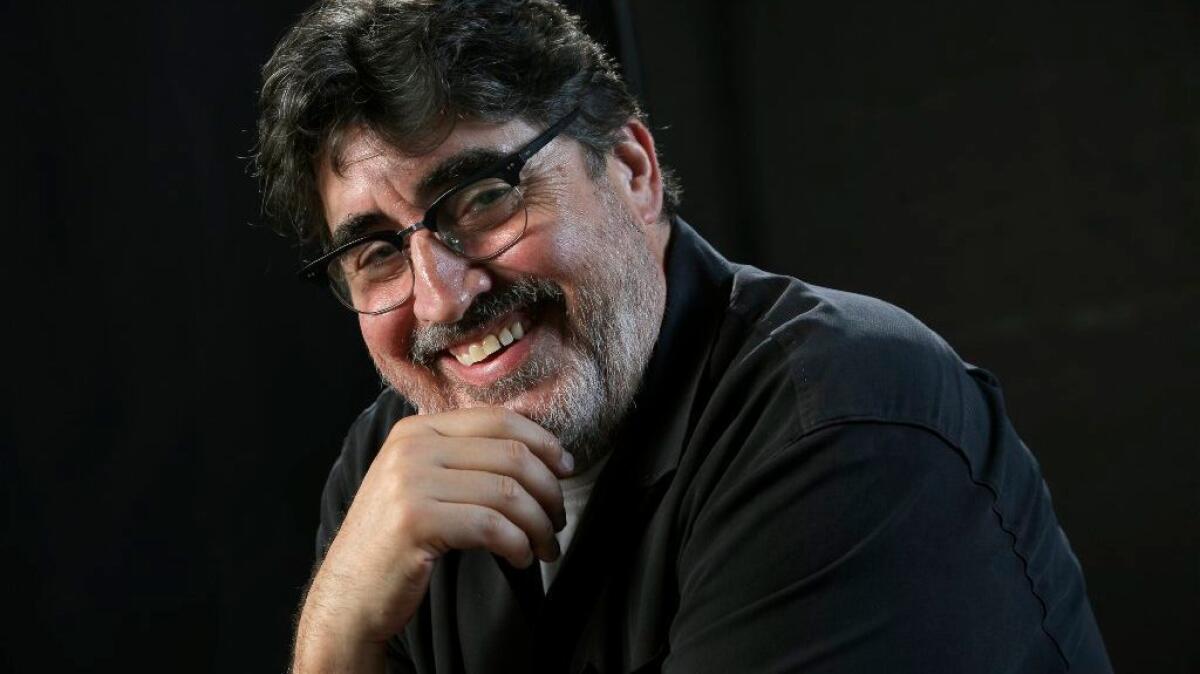Alfred Molina’s Robert Aldrich is a director desperate for success in ‘Feud’

Alfred Molina has been a jack-of-all-stages, creating memorable characters and tackling multiple genres on the big and small screens as well as in the theater.
His latest role as slumping Hollywood director Robert Aldrich, who sees his career revived amid great turmoil with the film “Whatever Happened to Baby Jane?” is no exception.
Playing off exceptional castmates Susan Sarandon as Bette Davis, Jessica Lange as Joan Crawford and Stanley Tucci as studio mogul Jack Warner, Molina brings intensity to the FX drama “Feud: Bette and Joan.” We recently chatted with the actor about the trial and tribulations — and entitlements— of his character as well as a 40-year career that has had us laughing and crying.
Everybody talks about the viciousness between Bette and Joan but what about Jack Warner and Robert Aldrich? Those were some crackling scenes.
Robert was a journeyman director and he’d gone through almost every genre. And when “What Ever Happened to Baby Jane?” arrived, his career, like the careers of Joan Crawford and Bette Davis, was in very much of a slump. And so Robert and Bette and Joan were all desperate for something, and so as you say, their relationship was symbiotic, and particularly with Jack Warner who had very little respect for Robert but saw here a chance to make some money. So Robert was kind of caught, I believe, in between this strange place where I don’t think he was relishing the idea of stoking the fire of this rivalry between Joan and Bette, but at the same time he understood that it was going to create buzz, it was going to create publicity, and that was all going to be good for the film.

“Feud’s” Alfred Molina talks about the FX series’ welcoming atmosphere; his character, director Robert Aldrich; and more.
He’s got Jack Warner, he’s got Bette, he’s got Joan, and he’s got his wife. I mean, your character is the character with the most problems.
But, in a sense, he created a lot of those problems because he belongs to a generation of men, men in the film business, who were pretty much allowed to just behave any way they wanted. They certainly weren’t answerable to any women in positions of authority. So his generation had a level of entitlement and privilege that they probably weren’t even aware of.
It’s just the way that it was and sadly, to some extent, the way it still is.
I thought one of the interesting elements of that particular thread was the scene when Alison Wright’s character, Pauline, comes to me and suggests that she might direct this movie that she’s written. And with no kind of judgment — I can’t remember the exact line, but he says something like, “Well, women don’t direct films. You know, no one’s done that.” And he didn’t say it in any way that was mean. It was just a fact. It was like saying, “Well, you know, water is wet.”
After “Baby Jane,” Robert Aldrich goes on to be a really successful director — “Dirty Dozen” and “Longest Yard,” “The Frisco Kid,” which was a later film for him, with Gene Wilder and Harrison Ford …
Bette’s career also carried on. Joan, less so. But there was certainly, to varying degrees, there was life after “Baby Jane” for all of them. Although it’s interesting how, when you look at some of the later moments in Bette’s life, she became less of a kind of vital artist and more of a sort of — she was like an institution somehow.
You talk about how Aldrich did so many genres. As an actor you’ve done absurd comedy, legit Broadway, serious drama, musicals. I mean, you’ve done everything too.
There’s a camaraderie, I must admit, among people who have done a bit of everything because nine times out of 10 we don’t plan it that way. When young actors ask me things like, “How do you plan a career?” my answer is always, “You don’t. A career is something you turn back on, you kind of go, ‘Oh, I did this and this.’” And if you’ve had a bit of luck and a bit of good fortune along the way, if you’ve managed to play some nice parts here and there, you look back on your so-called career and you’ll see a sort of crazy quilt of all kinds of different things. I remember in my final year at drama school, we would sit around and talk about what our dreams were and people were saying things like, you know, “I want to play all the clowns in Shakespeare before I’m 35,” or “I want to play Hamlet before I’m 29.” You know, we had all these kind of grandiose sort of dreams.
So what was yours?
Well, truly my dream was to be in a western.
See the most read stories this hour »
ALSO:
‘Feud’ star Alfred Molina says not much has changed since Davis-Crawford days
More to Read
From the Oscars to the Emmys.
Get the Envelope newsletter for exclusive awards season coverage, behind-the-scenes stories from the Envelope podcast and columnist Glenn Whipp’s must-read analysis.
You may occasionally receive promotional content from the Los Angeles Times.








